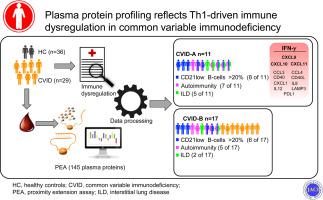Journal of Allergy and Clinical Immunology ( IF 11.4 ) Pub Date : 2020-02-11 , DOI: 10.1016/j.jaci.2020.01.046 Jonas Hultberg 1 , Jan Ernerudh 2 , Marie Larsson 3 , Åsa Nilsdotter-Augustinsson 4 , Sofia Nyström 1

|
Background
Common variable immunodeficiency (CVID) is a disorder characterized by antibody deficiency. A significant fraction of the patients suffer from immune dysregulation, which leads to increased morbidity and mortality. The pathogenesis of this condition is poorly understood.
Objective
Our aim was to find out whether the plasma protein signature in CVID is associated with clinical characteristics and lymphocyte aberrations.
Methods
A highly sensitive proximity extension assay was used for targeted profiling of 145 plasma proteins in 29 patients with CVID. Phenotyping of peripheral lymphocytes was done by flow cytometry. The findings were correlated with the burden of immune dysregulation.
Results
Unsupervised clustering of plasma protein profiles identified 2 distinct groups of patients with CVID that differed significantly in terms of the degree of complications due to immune dysregulation and in terms of the frequency of activated B- and T-cell subpopulations. Pathway analysis identified IFN-γ and IL-1β as the top enriched upstream regulators associated with higher grade of immune dysregulation. In addition, CVID was found to be associated with increased plasma levels of the B-cell–attracting chemokine CXCL13.
Conclusion
Clustering based on plasma protein profiles delineated a subgroup of patients with CVID with activated T cells and clinical complications due to immune dysregulation. Thus, data indicate that CVID-associated immune dysregulation is a TH1-mediated inflammatory process driven by the IFN-γ pathway.
中文翻译:

血浆蛋白谱分析反映了常见的可变免疫缺陷中TH1驱动的免疫失调。
背景
共同可变免疫缺陷症(CVID)是一种以抗体缺乏症为特征的疾病。很大一部分患者患有免疫失调,导致发病率和死亡率增加。这种病的发病机理了解甚少。
目的
我们的目的是发现CVID中的血浆蛋白特征是否与临床特征和淋巴细胞畸变有关。
方法
高敏感度邻近延伸分析用于29位CVID患者中145种血浆蛋白的靶向分析。通过流式细胞术进行外周淋巴细胞的表型分析。这些发现与免疫失调的负担有关。
结果
血浆蛋白谱的无监督聚类确定了2组不同的CVID患者,它们在免疫免疫失调引起的并发症程度以及激活的B细胞和T细胞亚群的频率方面均存在显着差异。途径分析确定了IFN-γ和IL-1β是与较高水平的免疫失调相关的最富集的上游调节剂。此外,发现CVID与吸引B细胞的趋化因子CXCL13的血浆水平升高有关。
结论
基于血浆蛋白谱的聚类描述了具有活化T细胞和由于免疫调节异常引起的临床并发症的CVID患者亚组。因此,数据表明,与CVID相关的免疫失调是由IFN-γ途径驱动的T H 1介导的炎症过程。











































 京公网安备 11010802027423号
京公网安备 11010802027423号